Serving 1,680 students in grades 6-12, Lincoln Park Academy ranks in the top 30% of all schools in Florida for overall test scores (math proficiency is top 50%, and reading proficiency is top 50%).
The percentage of students achieving proficiency in math is 55% (which is higher than the Florida state average of 52%). The percentage of students achieving proficiency in reading/language arts is 67% (which is higher than the Florida state average of 52%).
The student:teacher ratio of 25:1 is higher than the Florida state level of 17:1.
Minority enrollment is 75% of the student body (majority Black), which is higher than the Florida state average of 65% (majority Hispanic and Black).
Quick Stats (2025)
- School Type: Magnet School
- Grades: 6-12
- Enrollment: 1,680 students
- Student:Teacher Ratio: 25:1
- Minority Enrollment: 75%
- Graduation Rate: ≥95% (Top 20% in FL)
- Overall Testing Rank: Top 30%
- Math Proficiency: 55% (Top 50%)
- Reading Proficiency: 67% (Top 20%)
- Science Proficiency: 70% (Top 20%)
- Source: National Center for Education Statistics (NCES), FL Dept. of Education
Top Rankings
Lincoln Park Academy ranks among the top 20% of public schools in Florida for:
Category
Attribute
Reading/Language Arts Proficiency
Science Proficiency
Graduation Rate
Diversity
School Overview
Lincoln Park Academy's student population of 1,680 students has stayed relatively flat over five school years.
The teacher population of 67 teachers has declined by 18% over five school years.
School Type
Grades Offered
Grades 6-12
Total Students
1,680 students
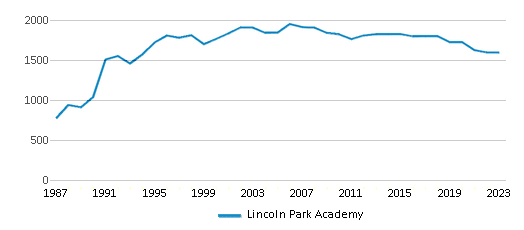
Gender %
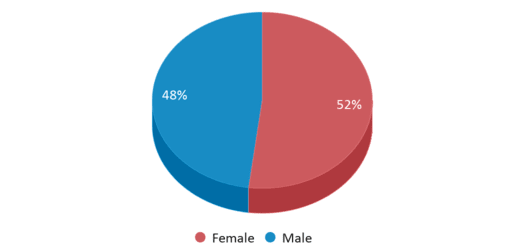
Total Classroom Teachers
67 teachers
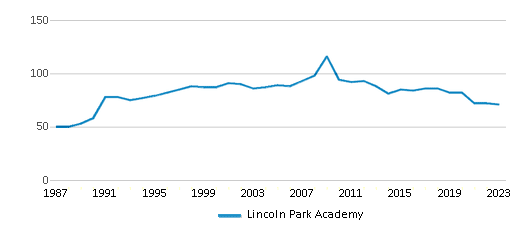
Students by Grade
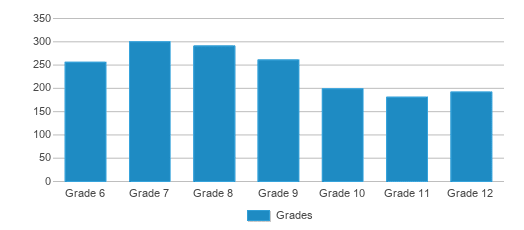
School Rankings
Lincoln Park Academy ranks within the top 30% of all 3,704 schools in Florida (based off of combined math and reading proficiency testing data).
The diversity score of Lincoln Park Academy is 0.70, which is equal to the diversity score at state average of 0.70. The school's diversity has stayed relatively flat over five school years.
Overall Testing Rank
#1076 out of 3704 schools
(Top 30%)
(Top 30%)
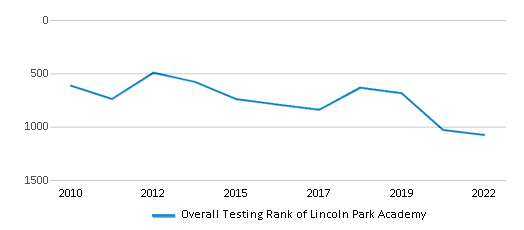
Math Test Scores (% Proficient)
55%
52%
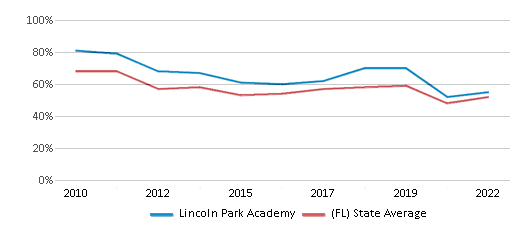
Reading/Language Arts Test Scores (% Proficient)
67%
52%
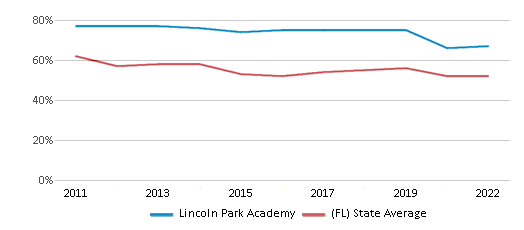
Science Test Scores (% Proficient)
70%
52%
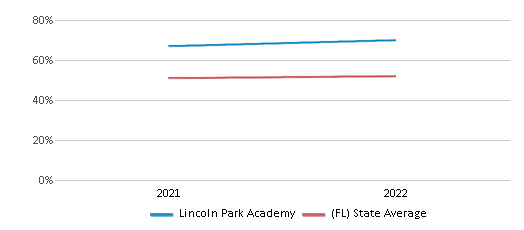
Student : Teacher Ratio
25:1
17:1
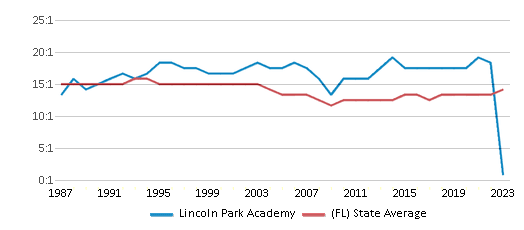
American Indian
n/a
n/a
Asian
4%
3%
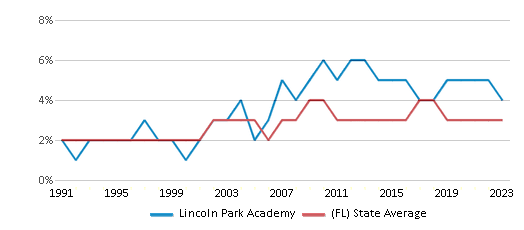
Hispanic
28%
37%
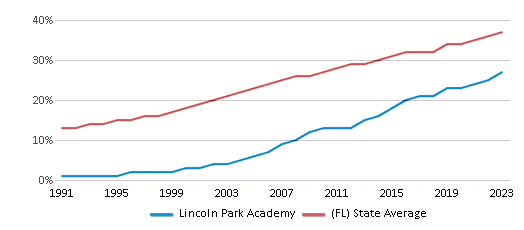
Black
40%
21%
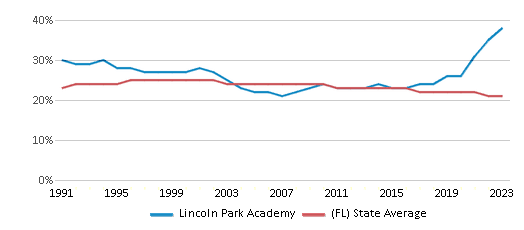
White
25%
35%
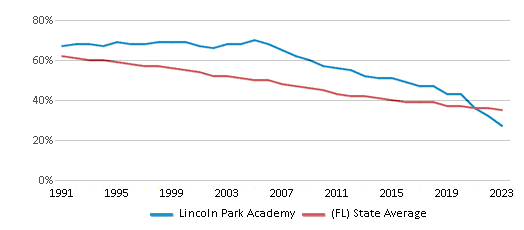
Hawaiian
n/a
n/a
Two or more races
3%
4%
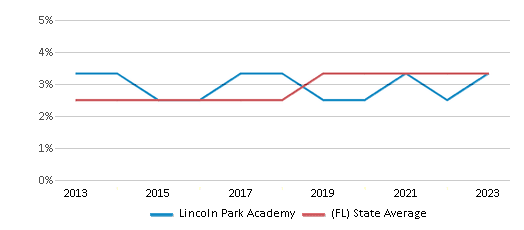
All Ethnic Groups
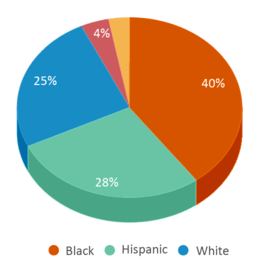
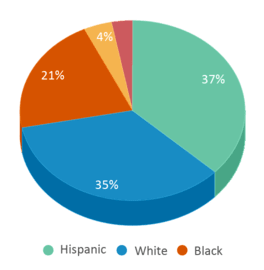
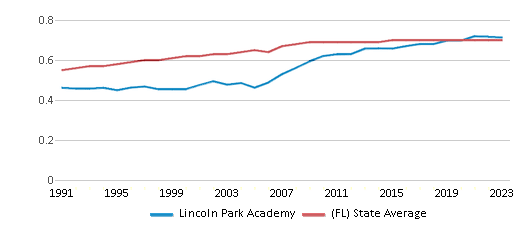
Graduation Rate
≥95%
87%
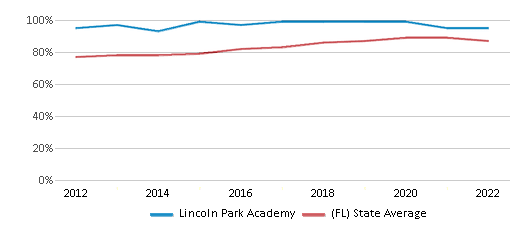
Participates in the National School Lunch Program (NSLP)
Yes
Eligible for Free Lunch
43%
47%
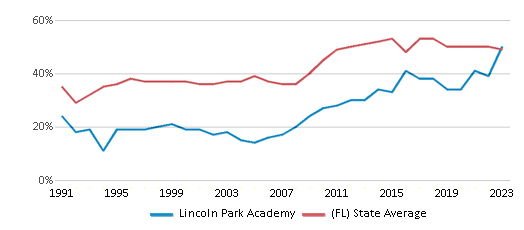
Eligible for Reduced Lunch
9%
4%
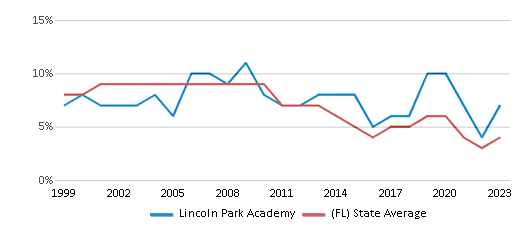
School Statewide Testing
School District Name
Source: National Center for Education Statistics (NCES), FL Dept. of Education
Profile last updated: 02/09/2025
Frequently Asked Questions
What is Lincoln Park Academy's ranking?
Lincoln Park Academy is ranked #1076 out of 3,704 schools, which ranks it among the top 30% of public schools in Florida.
What percent of students have achieved state testing proficiency in math and reading?
55% of students have achieved math proficiency (compared to the 52% FL state average), while 67% of students have achieved reading proficiency (compared to the 52% FL state average).
What is the graduation rate of Lincoln Park Academy?
The graduation rate of Lincoln Park Academy is 95%, which is higher than the Florida state average of 87%.
How many students attend Lincoln Park Academy?
1,680 students attend Lincoln Park Academy.
What is the racial composition of the student body?
40% of Lincoln Park Academy students are Black, 28% of students are Hispanic, 25% of students are White, 4% of students are Asian, and 3% of students are Two or more races.
What is the student:teacher ratio of Lincoln Park Academy?
Lincoln Park Academy has a student ration of 25:1, which is higher than the Florida state average of 17:1.
What grades does Lincoln Park Academy offer ?
Lincoln Park Academy offers enrollment in grades 6-12
What school district is Lincoln Park Academy part of?
Lincoln Park Academy is part of St. Lucie School District.
School Reviews
5 1/6/2020
This school is the best a high provides good lunches.
5 9/9/2017
Thankful for the education, support and encouragement I received as a student. LPA is an academic school, meant for students who have educational goals in mind, not for those wanting an easy diploma. The strict dress code and enforcement of rules is necesary to weed out those students not interested in learning.
2 6/1/2012
great orchestra, we need more players. but its way too strict, and the dean for middle school is unstable.the dress code is ridiculous, and they should really have cooking classes and other fun classes that STUDENTS would enjoy. And school DOESN''T have too be boring,since were one of the best schools in the nation how about having a little bit of a reward for our achievements!
2 9/6/2010
This school is not the school to send you rchild to if your child want to getinto and after school activity. They have not way to bus the kids home, so unless you are a stay home mom or dad and can make your own hours. The office staff is also very rude and not very helpful.
Review Lincoln Park Academy. Reviews should be a few sentences in length. Please include any comments on:
- Quality of academic programs, teachers, and facilities
- Availability of music, art, sports and other extracurricular activities
Recent Articles

What Is A Charter School?
Explore the world of charter schools in this comprehensive guide. Learn about their history, how they operate, and the pros and cons of this educational innovation. Discover key facts about charter schools, including admission policies, demographics, and funding, as well as what to look for when considering a charter school for your child.

10 Reasons Why High School Sports Benefit Students
Discover the 10 compelling reasons why high school sports are beneficial for students. This comprehensive article explores how athletics enhance academic performance, foster personal growth, and develop crucial life skills. From improved fitness and time management to leadership development and community representation, learn why participating in high school sports can be a game-changer for students' overall success and well-being.

February 05, 2025
Understanding the U.S. Department of Education: Structure, Impact, and EvolutionWe explore how the Department of Education shapes American education, from its cabinet-level leadership to its impact on millions of students, written for general audiences seeking clarity on this vital institution.





